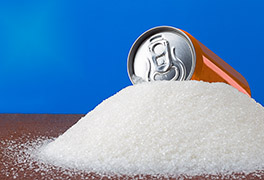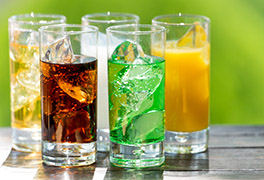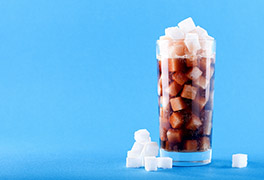Do Diet Drinks Cause Tooth Decay
Soft Drinks and Tooth Decay
The consequences of regular consumption of soft drinks on your dental health may be a little hard to swallow. Many school-aged children and teens today have come to consider drinking soda and other sugar-filled beverages to be a regular part of their daily routine. As a result, the dental community is seeing more evidence of tooth decay in young people. Soft drinks also provide large amounts of calories to kids, who already do not meet national dietary guidelines and are experiencing obesity in epidemic proportions.
The Impacts of Sugar-Sweetened Beverages
The American Heart Association recommends that kids ages 2 to 18 should have less than 25 grams, or 6 teaspoons, of added sugars daily. That's nearly impossible to achieve for soda drinkers, considering one 12-ounce can of regular soda contains 10 teaspoons of sugar—about 65% more added sugars than the recommended daily limit. Supersizing your beverage to a 20-ounce bottle of "pop" contains 16 teaspoons of the sweet stuff—230% more added sugars than the recommended daily limit!
Not only does drinking sugar-sweetened beverages contribute to the ever-growing obesity problem in children in the United States, but it can also play a major role in dental decay. Even with regular brushing and flossing, both regular and diet sodas can break down the enamel of teeth. Tiny bacteria live between and around teeth and, when exposed to the sugar in soft drinks, produce an acid that causes damage to tooth enamel, which eventually leads to decay and cavities. And it doesn't take long—this acid can begin to wreak havoc in only 20 minutes!

Not Hip to Sip

It's not just soda that's contributing to an increase in tooth decay. Nationwide, students are drinking more sports drinks and fruit juices, which also contain high concentrations of sugar. The problem is with the frequency that a child's teeth are exposed to sugar throughout the day. Nursing soft drinks significantly contributes to the development of tooth decay.
For example, if a student takes one small sip of soda, and then a minute later, takes another small sip, and then another sip—and this goes on during the course of one day—teeth are exposed over and over again to high concentrations of sugar and acid without any kind of break.
Even sugar-free soda is harmful to teeth because it contains high amounts of acid, leading to a breakdown in dental enamel. Because students typically do not brush their teeth during school hours, their risk of getting cavities increases dramatically.
Sugar in Disguise
If any of these added sweeteners are listed as an ingredient in your drink, you may want to opt for water or milk:
- brown sugar
- cane crystals/sugar
- corn sweetener
- dextrin
- evaporated cane juice
- fruit juice concentrate
- high fructose corn syrup
- honey
- malt syrup
- maple syrup
- molasses
- most ingredients ending with the letters "ose" (e.g., fructose, lactose, sucrose maltose, dextrose)

The Benefits of Drinking Water
There are many benefits to drinking water:
- Reduces muscle cramping and fatigue when consumed before, during, and after exercise.
- Regulates body temperature. To sweat, you need plenty of water.
- Helps you get well when you're sick by controlling fever and replacing lost fluid.
- Keeps you hydrated, alert, and energized. Even minor dehydration can cause a loss of concentration, fatigue, and irritability.
- Prevents you from confusing hunger with thirst, which can help you control your weight.

Do Diet Drinks Cause Tooth Decay
Source: https://www.massdental.org/Public/Oral-Health-Topics/Soft-Drinks-and-Tooth-Decay